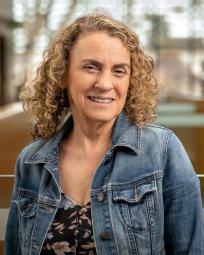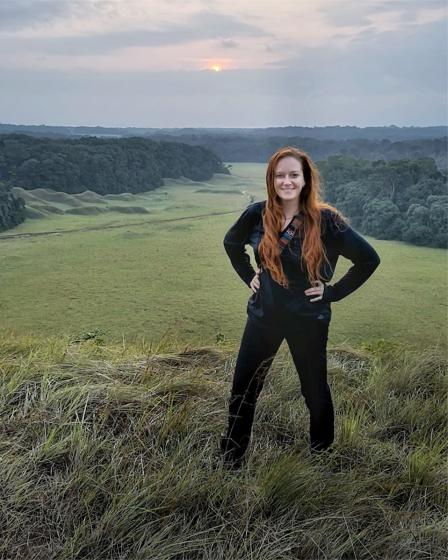

YSE Class of ’23: For Megan Sullivan, It Is All About Sustaining Forests
From drawing to exploring trees, doctoral student Megan Sullivan focuses on logging impacts on tropical forest ecology in Africa.

From drawing to exploring trees, doctoral student Megan Sullivan focuses on logging impacts on tropical forest ecology in Africa.
Growing up in rural Ohio, Megan K. Sullivan ’23 PhD submitted a drawing of a tree in her backyard and an essay expressing her concern for the environment to a contest at the local library. She thought her future might be in art or journalism.
“It was really interesting to think back on that because I didn't always know I wanted to be an ecologist,” Sullivan says. “But I can see that interest was in me somewhere when I was young.”
In college, Sullivan pursued her interest in scientific illustration at the Cleveland Institute of Art. During her freshman year, she spent many hours drawing tropical plants inside a room at the Cleveland Botanical Gardens, which had a humidifier system to replicate a natural environment for the plants and a soundtrack of jungle noises and animal sounds. As she drew, Sullivan found that she wanted to learn more about the plants. She enrolled in the ecology, evolution, and organismal biology program at The Ohio State University.
While earning her bachelor’s degree, she was an intern in forest ecology with the U. S. Forest Service and a field researcher with the Smithsonian Tropical Research Institute in Panama. After graduating from OSU, she became a research technician at Duke University conducting transect censuses at the Ipassa research station in Makokou, Gabon, in Central Africa. It was there, she says, she discovered her passion.
“Gabon was my entry point for experiencing tropical forests and learning what the country was like,” Sullivan says. “I ended up managing a lot of different research projects. We would walk transects through the forests and see all these different animals. We would go to villages and interview people about what they thought about hunting or environmental work. It gave me a very broad picture of what the ecosystem was like and how the people and the ecosystem related.”
We can’t only look at the direct impacts of logging on large trees immediately after timber is cut. We also must look at the impacts on biodiversity and ecosystem services when considering how logged forests recover over time.”
While in Gabon, Sullivan listened to the strong opinions local community members had about logging. She delved further into the issue and developed her dissertation on the ecological impact of selective logging in Gabon by setting up long-term vegetation monitoring plots to understand how logging activities change the composition, structure and function of seedlings, saplings, and mature trees in tropical rainforests.
Sullivan found that low-intensity logging had minor impacts on forest structure, diversity, and species composition. Her research also revealed that logged forest understories had higher abundancies of lianas — climbing plants that hang from trees especially in tropical forests — than unlogged areas.
“It's important to look at several metrics of how logging impacts ecosystems,” she says. "We can’t only look at the direct impacts of logging on large trees immediately after timber is cut. We also must look at the impacts on biodiversity and ecosystem services when considering how logged forests recover over time.”
Liza Comita, professor of tropical forest ecology and co-director of the Yale Center for Natural Carbon Capture, who served as Sullivan’s doctoral adviser, says Sullivan designed and executed an exciting and challenging dissertation research project during her time at YSE.
“Her project offers insights into fundamental ecological processes while at the same time having important implications for biodiversity conservation and sustainable management of African tropical forests,” Comita says.
Sullivan was a 2018-2022 Lewis B. Cullman Joint Yale School of the Environment and New York Botanical Garden Fellow and received a 2016-2021 National Science Foundation Graduate Research Fellowship.
After commencement, she will continue working as a tropical ecologist in Africa as a Fulbright Scholar at the University of Rwanda and will be a postdoctoral research associate at the High Meadows Environmental Institute at Princeton University.
“I really love doing research and I really enjoy working in Gabon and in African forests. For the moment, I'm going to continue pursuing that research. It puts me in a position to connect with other people about the environment, make connections to conservation, and learn more about the world. I'm looking forward to doing that in whatever form it may be for at least the next couple of years," Sullivan says.
